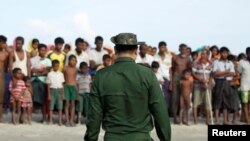"We are the voice of the voiceless. This is our slogan," said Ajmeer Omar, a reporter and anchor for Rohingya Vision TV.
It is a well-worn maxim among journalists the world over, but for Ajmeer and his colleagues, it may be especially true.
In 2012, Rohingya Vision TV, R-Vision for short, became the first news broadcaster both for and by the Rohingya, a stateless Muslim group that claims a distinct ethnic identity rejected by the government of Buddhist-majority Myanmar, where they are denied citizenship even after generations of putting down roots.
Regarded as among the most persecuted people in the world, more than 1 million Rohingya now live in teeming refugee camps in eastern Bangladesh, driven from their homes in western Myanmar's Rakhine state by a series of deadly communal clashes and military-backed raids. Many of those still in Rakhine are cut off from each other and from local markets, hospitals and schools.
Myanmar's military claims its latest raids in 2017 were part of a legitimate counter-insurgency operation against Rohingya militants in northern Rakhine. It has denied multiple reports of systematic arson, rape and murder by its forces, while restricting access to the area to journalists and most aid groups.
Muhammad Noor founded R-Vision to challenge the military's narrative.
200,000 views a day
Born and raised in Saudi Arabia by Rohingya parents who fled Rakhine in the 1970s, the IT systems analyst also wanted to offer a counterweight to news coverage that he felt often misrepresented his people and underreported their plight.
"We were saying that we can't wait until, you know, other media comes and asks [us for] our story, our side of the story and broadcasts this. We need to come up with our own initiative," Noor told VOA.
Explaining the news outlet's name, he said, "it means to say we need to bring back our vision, we need to give the Rohingya a vision and see the world and communicate with the world and get our voice heard."
Launched in Saudi Arabia, R-Vision opened a second branch in 2014 in Malaysia, where it drew on a sizeable Rohingya refugee community to recruit most of its staff, who all came to the project, like Noor, with no formal journalism training or experience. It has since opened smaller branches in Bangladesh, Pakistan and Canada, broadcasting daily via the internet in the Rohingya language and less frequently in Arabic, Burmese and English.
Across all platforms, Noor said, the outlets can get up to 200,000 views a day.
Secret sources
To break the information barrier in Rakhine, R-Vision recruited a broad network of secret Rohingya sources and trained them to be citizen journalists who feed information to its reporters outside of Myanmar. Noor said the outlet has smuggled thousands of phones into Rakhine over the years, along with solar panels to keep them charged, videos about how to use them, and tips to stay safe.
"If the [Myanmar] authority know that this guy is, you know, giving information to R-Vision, they will kill [him]," Ajmeer said over dinner at a small cafe near his office in Kuala Lumpur at the end of a busy day.
John Quinley, a human rights specialist with the non-governmental organization Fortify Rights, which focuses on the Rohingya, said his group and others have relied on R-Vision's reports and sources to see through the curtain the Myanmar military has drawn around northern Rakhine.
"They're at the cutting edge, at the frontier of getting a lot of the first-hand information out, and a lot of journalists follow up on the details that they release on their website," he said.
"But these fact-finders are taking great personal risk to be able to document abuses that others can't document," he added, referring to the outlet's sources.
An internet blackout on northern Rakhine imposed by the military since June has made their work all the more difficult — and important.
Bias accusations
While trying to counter the bias of the Myanmar government and media, though, R-Vision has been accused of indulging in bias itself.
Noor is unapologetic, recalling an exchange he had with a Western journalist who raised the issue at a conference in Bangkok.
"I said, look, there are three kinds of media when it comes to Rohingya news: one that is pro-government, one that is somewhere in the middle ... I said we are here pro-Rohingya, simple as that, and we admit it," he said.
"I know you have your own ethics, you have your own agenda. You want to play middle, you play," he said, still recalling the exchange. "We are not here to play middle. We are here to play Rohingya side. Simple."
Noor insists that agenda does not come at the expense of accuracy. He says R-Vision uses two to three sources that don't know each other, even if they are neighbors, to cross check every story before reporting it.
Quinley said journalists and rights monitors should nonetheless double check what R-Vision reports, and that he would like to see it do more to hear from all sides of a story as the news outlet evolves.
"They've definitely made mistakes in the past, but you know, for the most part, they put out really credible, reliable information," he said.




